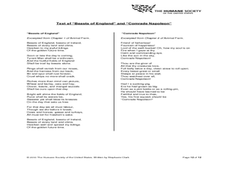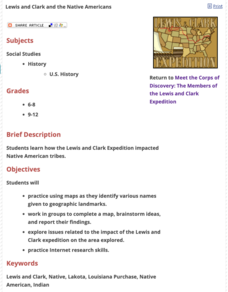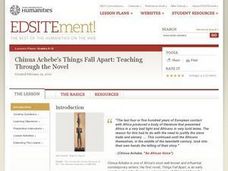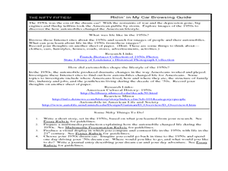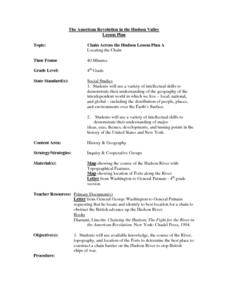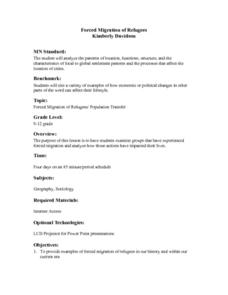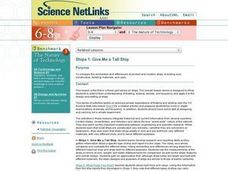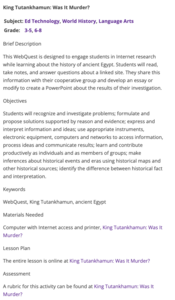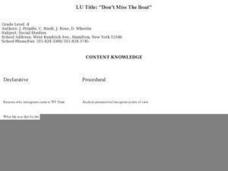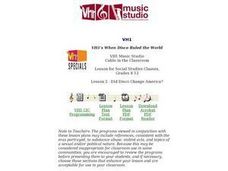Curated OER
Flush It! Throw It! Out of Sight, Out of Mind!
Students describe disposal procedures by reviewing water and solid waste disposal cycles and what happens when one step is omitted. They examine the connection between industry and human health.
Curated OER
Animal Farm - The Rest of the Story
Students participate in a reader's theater using farm animals in the novella Animal Farm. In this Animal Farm lesson plan, students evaluate interpretations using the text, personal experience, and historical events.
Curated OER
Learning About Guatemala Through Its Kites
Students are introduced to Guatemala and to the tradition of giant kites. They decorate the kite sail and construct the kite. Students identifies possible causal factors contributing to given historical events.
Curated OER
Gandhi's Salt March, A Simulation
Young scholars examine Gandhi's Salt March. In this peace and tolerance lesson, students discuss the Salt Tax Levy that was imposed in India. Young scholars then debate how the Indian National Congress should have handled the issue.
Rutgers University
African-Americans in WWII
Using transcripts of interviews of African-Americans who served in WWII, class members work in pairs to understand their experience. Prior to the group work, the teacher provides background on WWII and the African-American experience....
Curated OER
Lewis and Clark and the Native Americans
Young scholars practice using maps and identifying landmarks on the Lewis and Clark expedition. They research Lewis and Clark's relationship with the Native Americans and report their findings to the class. They identify the impact of...
Curated OER
Into a New Millennium, Lesson 4: 1970 to Present
Students view different slides on how agriculture has changed in America. In groups, they are given one resource to read and answer discussion quesions. After reviewing answers, they participate in different scenerios to help protect...
Curated OER
Early Exploration of North America
Third graders "travel" from Europe to North America as Columbus did. They organize the information into chronoglogical order.
Curated OER
Chinua Achebe's Things Fall Apart: Teaching Through the Novel
Students are introduced to Chinua Achebe's first novel and to his views on the role of the writer in his or her society. It can be used alone or in conjunction with the related instructional activity Chinua Achebe's Things Fall Apart.
Curated OER
Sybil Ludington's Ride - a poem
Fourth graders examine the role a teen from the Hudson Valley played in the American Revolution. They view the map of Sybil's ride and calculate the distance using the map's legend.
Curated OER
Wings, Chrome, and Tailfins: Automobiles of the 1950s
Students study the automobile industry. In this cultural history instructional activity, students explore 1950s America as they view a teacher-created PowerPoint presentation regarding the 1950s. Students research how the automobile...
Curated OER
Chain Across the Hudson Lesson Plan A - Locating the Chain
Students read a letter from George Washington requesting them to identify on a map a location that would stop the advance of British warships. They choose a location and justify their choice.
Curated OER
Forced Migration of Refugees
High schoolers discuss the issue of refugees being forced to migrate. In groups, they focus on different groups forced to migrate and discover how it has changed their lives. They compare and contrast a forced migration in the past and...
Curated OER
Medical Establishment: Hall of Fame
Students discover what a medical establishment is and how it helps people with disabilities. In this medical lesson, students research information about a specific medical establishment online. Students then work in pairs to...
Curated OER
Give Me a Tall Ship
Sixth graders develop an understanding of floating, sinking, density, and buoyancy and apply it to the design of testing of ships.
Curated OER
Poet James Whitcomb Riley: Famous in His Own Day
An engaging biography of "Hoosier" poet James Whitcomb Riley serves as a springboard for study of his unique dialect-based verse. Several activities illuminate differences between spoken vernacular and formal language. Learners record...
Curated OER
King Tutankhamun: Was It Murder?
Students complete a WebQuest in which they research ancient Egypt and King Tutankhamun. They determine the difference between historical fact and interpretation before using their research to develop an essay or PowerPoint.
Curated OER
The Eagle Has Landed: Aztecs Find a Home
Pupils examine the Aztec civilization in what is now Mexico. Using a map, they locate the empire and explain the legend of the founding of Tenochtitlan. They explore the symbols on various Mexican flags and what they meant to the Aztec...
Curated OER
Finding Our Place in Time
Students utilize interviewing skills of an historian to research the time period of the 1970's. They use prior knowledge of the 1960's to explain the mood of the country in the 1970's.
Curated OER
Don't Miss The Boat
Fourth graders study immigration and what it is like to be an immigrant. They choose immigrant identities, dress appropriately, and role play during an International Fair where each student displays some aspect of his/her "home country."
Curated OER
American Immigration Past and Present
Learners simulate a Commission hearing in which the class attempt to arrive at an immigration policy; individual essays by each student; and, if time permits, individual or group projects based on some aspect of America's immigration...
Curated OER
Bob Dylan: No Direction Home
Students hold panel discussions on selected topics about the 1960s and their impact on modern-day events. As visual reinforcement, they watch the film about Bob Dylan and research the music of the period as well as his musical...
Curated OER
Did Disco Change America?
Students examine the economics of a time period along with the music.
Curated OER
Art and Anatomy: The Vitruvian Teen
Twelfth graders create an artistic version of a Vetruvian teen. In this anatomy lesson, 12th graders design an experiment to test the theory of the ideally proportioned man. They present their findings in class.



